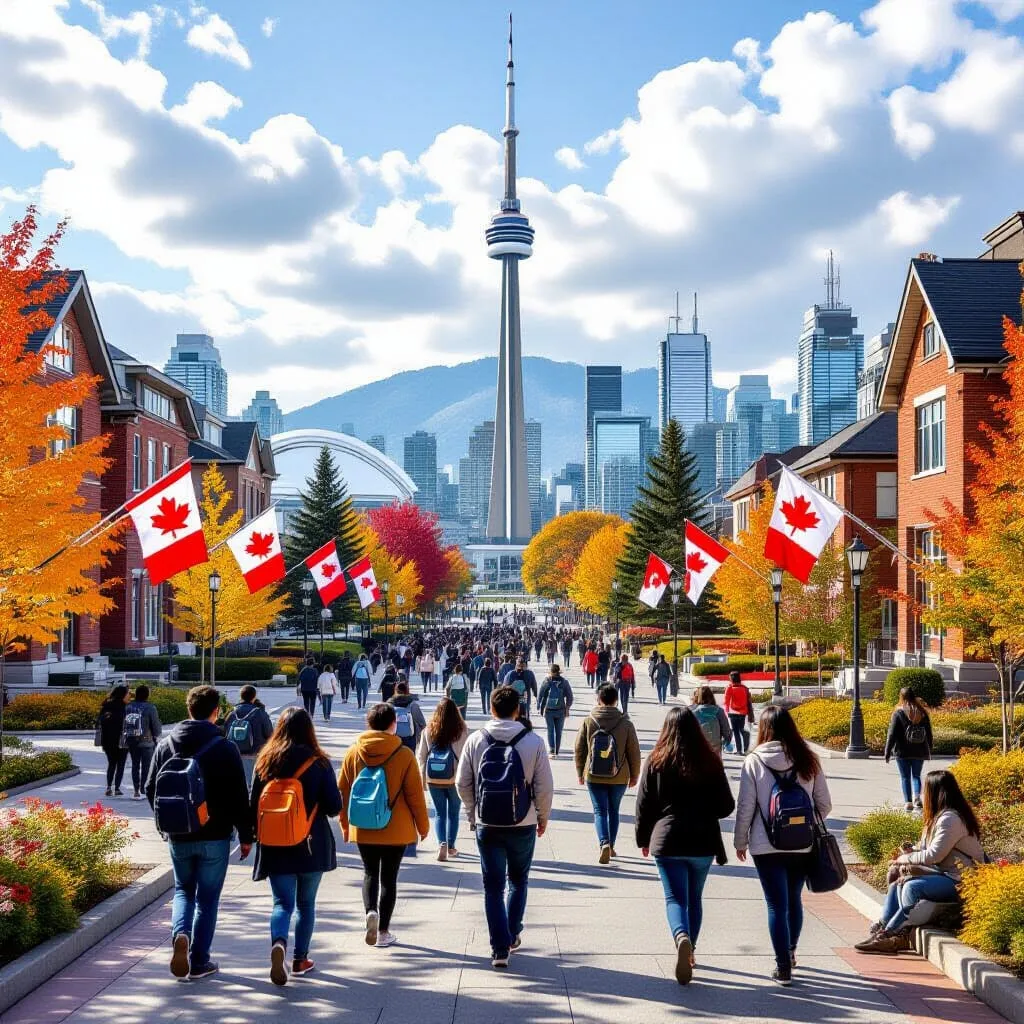Study In Canada
Studying in Canada: The Definitive Guide with Insights, Data, and Real Student Stories

You can read more about Studies Abroad in Canada at the link below:
Canada remains a global beacon for international education, attracting students with its high-ranking universities, diverse culture, and clear immigration pathways. However, 2025 marks a pivotal year of change.
The Canadian government, responding to national pressures, has introduced significant policy shifts, making it more crucial than ever for prospective students to be armed with accurate, in-depth, and real-world information.
This guide moves beyond the brochures, analyzing active discussions on Quora and Reddit and integrating verifiable data to present the unvarnished truth about the Canadian student experience today.
Top Universities in Canada: Beyond the Rankings

While global rankings from QS and Times Higher Education are a starting point, student forums reveal a more nuanced picture based on program strength, co-op opportunities, and city life.
- The "Big Three" - Global Powerhouses:
- University of Toronto (U of T): Consistently ranked number one in Canada, U of T is an academic behemoth. With over CAD $1.4 billion in annual research funding, it excels in fields like medicine, AI (at the Vector Institute), and finance (Rotman School of Management). A Quora user states, "The U of T name carries significant weight on a resume, globally. But be prepared for a highly competitive, sometimes impersonal environment due to its sheer size."
- University of British Columbia (UBC): Set against a stunning natural backdrop in Vancouver, UBC is a leader in sustainability research, forestry, and international relations. Its proximity to a thriving tech and film industry provides unique career pipelines. A student on Reddit notes, "The lifestyle at UBC is unbeatable if you love the outdoors. The downside is you're living in one of the world's most expensive cities."
- McGill University: Located in vibrant, bilingual Montreal, McGill offers a world-class education with a unique European flair. It is renowned for its programs in medicine, law, and arts. "Montreal's lower cost of living compared to Toronto is a huge advantage," a forum contributor explains. "You get a top-tier education without the same level of financial stress."
- The Specialist Powerhouses:
- University of Waterloo: Universally hailed on Reddit as the undisputed leader for Computer Science, Engineering, and Math. Its legendary co-op program is its main draw. As one alumnus on Quora writes, "I graduated from Waterloo with five different tech internships on my resume, including one at a FAANG company. The co-op program is why you go here. Full stop."
- McMaster University: Located in Hamilton, McMaster is a top-tier institution, particularly famous for its innovative, problem-based learning approach in its Health Sciences and Medical School.
- High-Value Contenders:
- University of Alberta & University of Calgary: These prairie powerhouses are lauded for their strong engineering programs (especially in energy sectors) and artificial intelligence research. Their key advantage, frequently cited on forums, is a significantly lower cost of living and a direct line to a robust job market in Alberta.
Advantages & Disadvantages: A Data-Driven Reality Check

Online discussions provide a raw, honest look at the student experience.
Advantages:
- Clear Pathway to Permanent Residency (PR): This remains Canada's single biggest draw. Data from Immigration, Refugees and Citizenship Canada (IRCC) consistently shows that former international students are one of the largest groups to transition to PR. The Post-Graduation Work Permit (PGWP) is the critical bridge. "The PGWP isn't just a visa; it's a three-year open work permit to build a Canadian career. No other country offers this so straightforwardly," a Redditor emphasizes.
- High-Quality, Publicly Funded Education: Canadian degrees are respected globally. Unlike the US system, the top universities are predominantly public, ensuring a high standard of quality across the board.
- Multiculturalism as a Lived Reality: Canada's diversity isn't just a talking point. According to Statistics Canada, over 23% of the population are immigrants. In Toronto, that number is nearly 50%. A Quora user from India shares, "I never felt like a minority here. I can find my community, my food, and my places of worship, which made the transition so much easier."
- Safety and Stability: Canada consistently ranks as one of the safest countries in the world. This is a frequently mentioned point of relief for both students and their parents back home.
Disadvantages:
- The Unforgiving Climate and its Hidden Costs: Forum users are blunt: the winter is a major challenge. "It’s not just the -30°C temperatures," warns a student in Edmonton on Reddit. "It’s the five months of snow and darkness that can seriously affect your mental health (look up Seasonal Affective Disorder - SAD). A proper winter gear setup can also cost you $500+ easily."
- A Severe Cost of Living and Housing Crisis: This is the most pressing issue in 2025. According to Rentals.ca, the average rent for a one-bedroom apartment in Toronto and Vancouver now exceeds CAD $2,500. A Quora user shares, "The government's $20,635 proof of funds is a survival number, not a living number. If you're in a big city, you will be in a constant state of financial stress on that budget."
- The "Canadian Experience" Conundrum: The job market is tough for newcomers. Many employers value local work experience, creating a difficult catch-22.
Case Study 1: A CS Job Search (Reddit Synthesis)
(Name Withheld), a Master's in Computer Science graduate from a good Ontario university, applied to over 300 jobs in his final semester. Despite a 3.8 GPA and strong technical skills, he received almost no callbacks. "Every rejection felt the same: 'not enough Canadian experience.' I finally landed an unpaid internship, which eventually converted to a full-time role, but those six months were the most stressful of my life. My advice: start networking and doing volunteer work or on-campus jobs from your very first semester."
Market-Leading FAQs: The Top 10 Questions Students Are Asking in 2025

- With the new visa cap, is it harder to get a study permit?
Yes. The cap (approx. 360,000 new permits for 2024) and the new Provincial Attestation Letter (PAL) system mean there's more competition. However, Master's and PhD programs are exempt from the cap, making postgraduate studies a more reliable route. - How much money do I actually need to show and have?
You must show tuition + $20,635 in living funds. However, forum consensus is that for a comfortable life in a major city, you need closer to CAD25,000 to 30,000 per year. - Will my PGWP be affected by the new rules?
If you are in a Master's or PhD program, you are largely safe and may even be eligible for a 3-year PGWP. However, students in many Public-Private Partnership (PPP) college programs are no longer eligible for a PGWP as of May 15, 2024. This is a critical change. - Is a two-year college diploma better than a one-year Master's?
It depends on your goal. A two-year diploma gives you a 3-year PGWP and job-ready skills. A one-year Master's gives you more points in the PR Express Entry system. The current trend on Reddit favors Master's degrees due to their exemption from the visa cap and higher PR scoring potential. - What's the reality of finding accommodation?
It is extremely difficult. "Be prepared to attend viewings with 50 other people," a Redditor in Toronto warns. "Scams are everywhere. Never rent a place without a video call walkthrough, and never pay a deposit before signing a formal lease." - Can I rely on part-time work to fund my studies?
No. Part-time work (now capped at 24 hours/week during semesters) should be considered for supplementary expenses only. Minimum wage will not cover your tuition and rent. - What's the biggest culture shock for South Asian students?
The "DIY" culture. "You are expected to do everything yourself—from assembling IKEA furniture to filing your own taxes. The level of independence required can be a shock," notes a Quora user. - How do I make Canadian friends?
"Step out of your comfort zone," is the universal advice. "Join a club for a hobby you love, whether it's hiking, board games, or volunteering. This is where you'll find genuine connections, not just in the classroom." (Reddit) - Which province is best for PR?
This changes constantly. While Ontario and BC are popular, their PR streams are highly competitive. Provinces like Alberta, Saskatchewan, and the Atlantic provinces have more targeted Provincial Nominee Programs (PNPs) that can be an easier pathway if you are willing to settle there. - Is it all worth it in 2025?
The consensus is that it's worth it if you go in with open eyes, a solid financial plan, and a clear career strategy. It is no longer an easy or guaranteed path.
Budget and Living Expenses: The Harsh Financial Reality

Case Study 2:(Name Withheld) Vancouver Budget Battle (Quora Synthesis)
(Name Withheld) secured admission to a top program at UBC. Her initial budget was CAD $1,800/month. "Within three months, I knew I was in trouble. My shared room alone was $1,100. Groceries were $500. My transit pass was over $100. I was working 20 hours a week and still falling short. I had to access my university's food bank twice, which was humbling. My warning to new students: your budget will be 25% higher than you think. Have a significant emergency fund."
Recent studies from universities have shown rising rates of student food insecurity, a topic now openly discussed on Reddit forums, underscoring the financial precarity many face.
| Expense | Toronto/Vancouver (CAD) | Montreal/Calgary (CAD) | Smaller Cities (CAD) |
| Accommodation (Shared) | $900 - $1,500 | $700 - $1,100 | $600 - $900 |
| Groceries | $400 - $600 | $350 - $500 | $300 - $450 |
| Transportation (Pass) | $140 - $160 | $90 - $100 | $80 - $110 |
| Phone/Internet | $80 - $120 | $70 - $110 | $70 - $100 |
| Mandatory Health Insurance | $60 - $70 | $60 - $70 | $60 - $70 |
| Personal/Leisure | $200 - $400 | $150 - $350 | $150 - $300 |
| Annual Living Estimate | $21,360 - $34,200 | $17,040 - $26,760 | $15,120 - $23,160 |
Navigating Government Regulations in 2025

- Study Permit Cap: An overall cap aims to reduce the number of new students. Master's, PhD, and K-12 students are exempt.
- Provincial Attestation Letter (PAL): A mandatory document from the province, confirming your spot under their allocation. This is a new, crucial step.
- PGWP Eligibility Changes: The biggest change is the exclusion of graduates from Public-Private Partnership college programs from PGWP eligibility. This has impacted thousands of students. Spouses of undergraduate students are also no longer eligible for open work permits.
The sentiment on forums is that these changes are designed to curb perceived abuses in the system and better align student intake with Canada's labour needs and infrastructure capacity.
Case Study 3: (Name Withheld) Strategic Choice (Reddit Synthesis)
(Name Withheld) wanted to study Data Analytics. While she could have applied to top universities in Toronto, she chose a program at Dalhousie University in Halifax, Nova Scotia. "My reasoning was strategic," she wrote on Reddit. "Tuition and rent were 40% cheaper. The class sizes were smaller, so I got more facetime with professors. Most importantly, the Atlantic Immigration Program offered a clearer, less competitive PR pathway. I have a job offer in Halifax and I love the community feel. I traded big-city glamour for genuine opportunity and peace of mind."
5 Key Takeaways for 2025

- Postgraduate Studies Are Now the Premier Pathway: With Master's and PhD programs exempt from the visa cap and graduates securing more PR points, postgraduate education has become the most strategic route into Canada for 2025.
- Finances are Non-Negotiable: The era of "figuring it out when you get there" is over. Arrive with your full first year's tuition and living expenses liquid, plus a robust emergency fund. Financial precarity is the number one reason students fail.
- Your "Source of Truth" is IRCC.gc.ca: The rules are changing rapidly. Do not rely on advice from agents, friends, or year-old YouTube videos. The official IRCC website is the only reliable source for information on visas and regulations. Check it weekly.
- Strategic Location Can Outweigh University Rank: Choosing a program in a province with a strong labour market for your field and a less competitive PNP can be a much smarter long-term play than simply attending the highest-ranked university in an expensive, saturated city.
- Mental and Social Resilience is as Important as Academic Brilliance: Canada offers immense opportunity, but it will test you. Be prepared for culture shock, loneliness, and stress. Proactively build a support network and use the mental health services your university offers from day one.
Your Ambition, Our Expertise

The path to studying in Canada in 2025 is more challenging, but the rewards for those who are well-prepared remain immense.
Navigating this new landscape requires more than just information; it requires a professional strategy.
This is where Augmentron Consultancy excels.
We are your strategic partners, dedicated to transforming your Canadian dream into a reality.
Our expert counselors provide cutting-edge advice tailored to the 2025 regulations, helping you select programs and institutions that are not only academically excellent but also strategically aligned with Canada's evolving immigration and labour market needs.
We guide you in crafting an impeccable, scrutiny-proof visa application that highlights your strengths as a genuine and valuable addition to Canada.
Don't navigate this critical journey alone.
Secure your future with proven expertise.
Contact Augmentron Consultancy today to book your personalized consultation and build your definitive roadmap to success in Canada.
You can read more about Studies Abroad in Canada at the link below:



